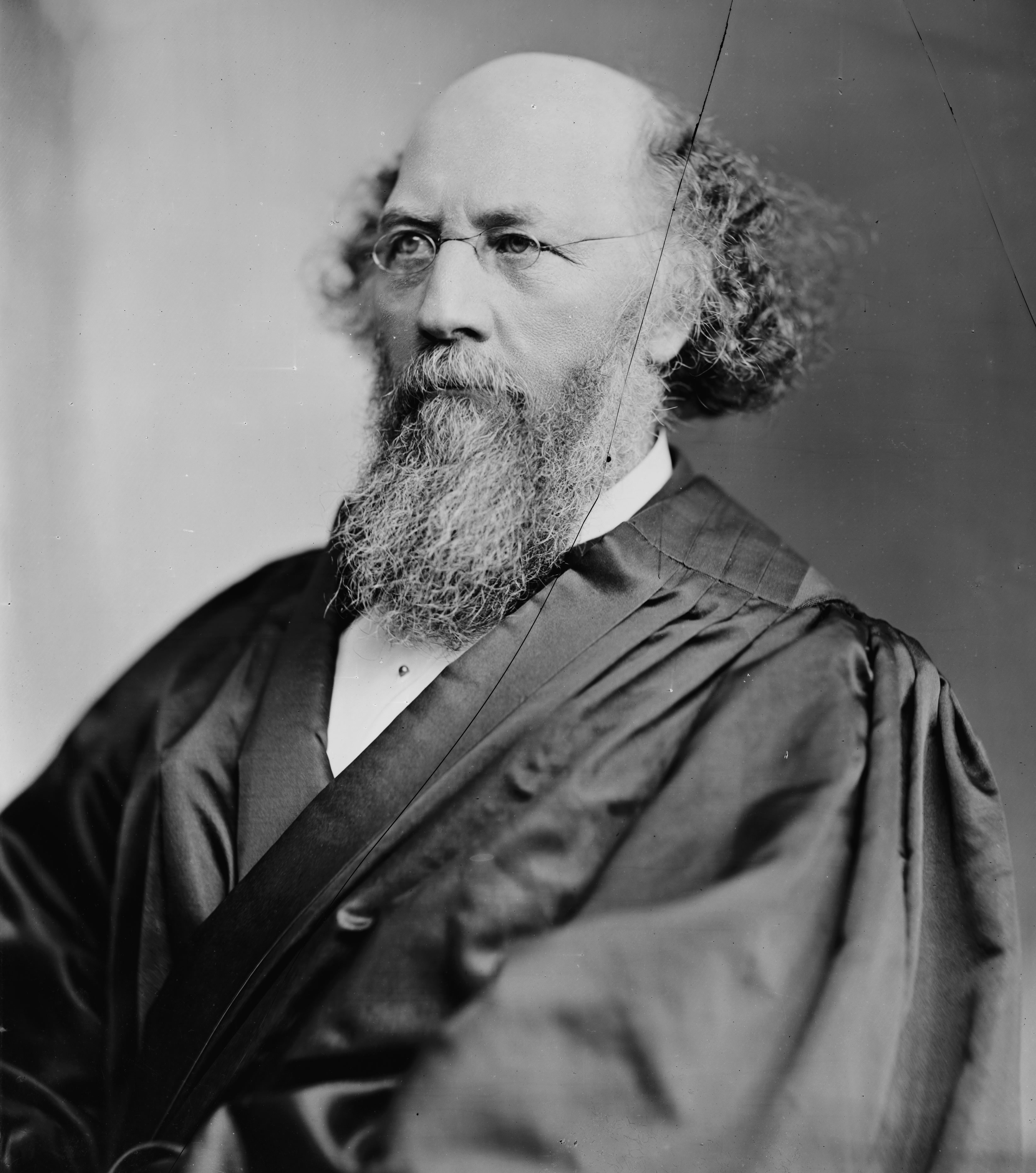- Stephen Johnson Field
Infobox Judge
name = Stephen Johnson Field

imagesize =
caption =
office = Associate Justice of the United States Supreme Court
termstart =May 20 1863
termend =December 1 1897
nominator =Abraham Lincoln
appointer =
predecessor = "(none)"
successor =Joseph McKenna
office2 =
termstart2 =
termend2 =
nominator2 =
appointer2 =
predecessor2 =
successor2 =
birthdate = birth date|1816|11|4|mf=y
birthplace =Haddam, Connecticut , U.S.
deathdate = death date and age|1899|4|9|1816|11|4|mf=y
deathplace =Washington, D.C. , U.S.
spouse = Sue Virginia FieldStephen Johnson Field (
November 4 1816 –April 9 1899 ) was an associate justice of theUnited States Supreme Court fromMay 20 1863 , toDecember 1 1897 . Prior to this, he was the 5th Chief Justice of theCalifornia Supreme Court .Early life and education
Born in
Haddam, Connecticut , he was the sixth of the nine children ofDavid Dudley Field I , a Congregationalist minister, and his wife Submit Dickinson. He grew up inStockbridge, Massachusetts , and went toTurkey at thirteen with his sister and her missionary husband. He graduated fromWilliams College ,Williamstown, Massachusetts , in 1837. While attending Williams College he was one of the original Founders ofDelta Upsilon Fraternity. After studying law inNew York City with his brotherDavid Dudley Field II , they practiced law together until 1848 when he went west toCalifornia in the Gold Rush. [Robert Green McCloskey, "American Conservatism in the Age of Enterprise, 1865-1910" (1951; Harper & Row, 1964), pp. 86-92.]Career in California politics and law
There his legal practice boomed and he was elected
alcalde , a form ofmayor andjustice of the peace under the old Mexican rule of law, of Marysville. Because the Gold Rush city could afford nojail , and it cost too much to transport prisoners to San Francisco, Field implemented the whipping post, believing that without such a brutal implement many in the rough and tumble city would be hanged for minor crimes. The voters sent him to theCalifornia State Assembly in 1850 to represent Yuba County, but he lost a race the next year for the State Senate. His successful legal practice led to his election to theCalifornia Supreme Court in 1857, serving six years. [McCloskey, "American Conservatism", pp. 96-97.]U.S. Supreme Court justice
Abraham Lincoln appointed him to the newly created tenth Supreme Court seat, to achieve both regional balance (he was a Westerner) and political balance (he was a Democrat, albeit a Unionist one). It would also give the Court someone familiar with real estate and mining issues.He was a vocal proponent of the
substantive due process theory that protectedproperty rights from regulation under the Fourteenth Amendment--as illustrated in his dissents to the "Slaughterhouse Cases " and "Munn v. Illinois ". Field's views were eventually adopted by the court's majority, but only after his death. However, he helped end theincome tax ("Pollock v. Farmers' Loan and Trust Company "), limit anti-trust law ("United States v. E.C. Knight Company "), and the power of theInterstate Commerce Commission .On the issue of ethnic minorities, he had a mixed record. Field wrote opinions against California's laws discriminating against the Chinese immigrants to that state. [McCloskey, "American Conservatism", pp. 109-111.] However, Justice Field dissented in "
Strauder v. West Virginia ", a case holding that the exclusion of African-Americans from a jury that convicted Strauder, an African-American, of murder, was a violation of the Fourteenth Amendment'sEqual Protection Clause . He also joined the infamous case "Plessy v. Ferguson " that upheldracial segregation .Field insisted on breaking
John Marshall 's record of thirty-three years on the court, even though he was not able to handle the workload. His colleagues asked him to resign due to his being intermittentlysenile [http://www.supremecourthistory.org/04_library/subs_volumes/04_c03_f.html] but he refused, staying on until 1897. He lived only two years more, dying inWashington, D.C. , and was buried there in theRock Creek Cemetery .There was an assassination attempt on Justice Field by a former associate of his on the California Supreme Court,
David S. Terry . Terry was shot and killed by Field's bodyguard. Ironically, legal issues arising from the shooting came before the Supreme Court in the 1890habeas corpus case of "In re Neagle ". [George C. Gorham, “The Story of the Attempted Assassination of Justice Field by a Former Associate on the Supreme Bench of California,” "Journal of the Supreme Court Historical Society", Volume 30, Issue 2 (2005).]Notes
References
* Paul Kens, "Justice Stephen Field: Shaping Liberty from the Gold Rush to the Gilded Age" (University Press of Kansas, 1997). ISBN 978-0-7006-0817-1
ee also
*Corporate personhood
External links
* [http://www.pbs.org/wnet/supremecourt/personality/robes_field.html Stephen Johnson Field] at
PBS
*gutenberg author| id=Stephen+Johnson+Field | name=Stephen Johnson Field
Wikimedia Foundation. 2010.
